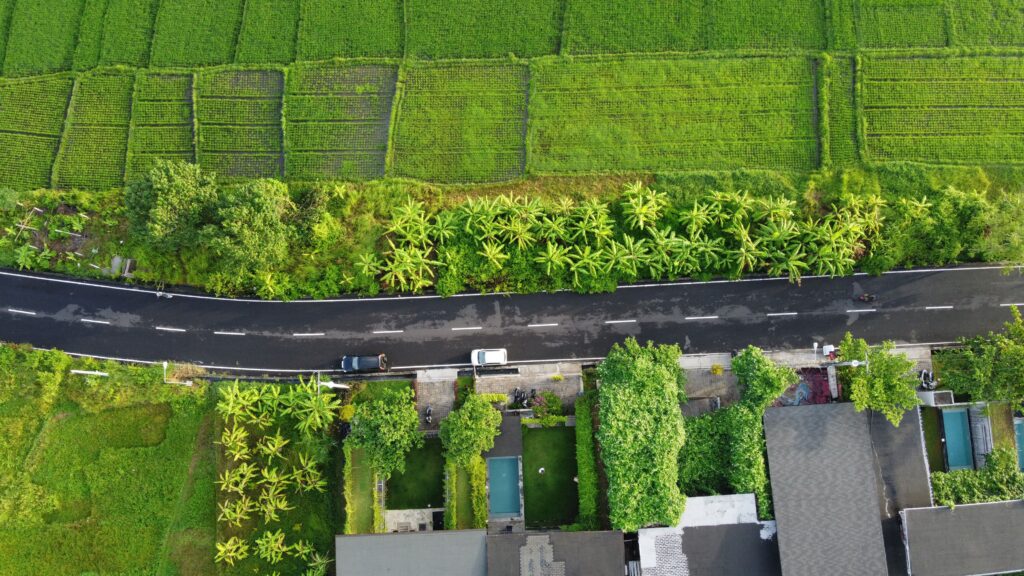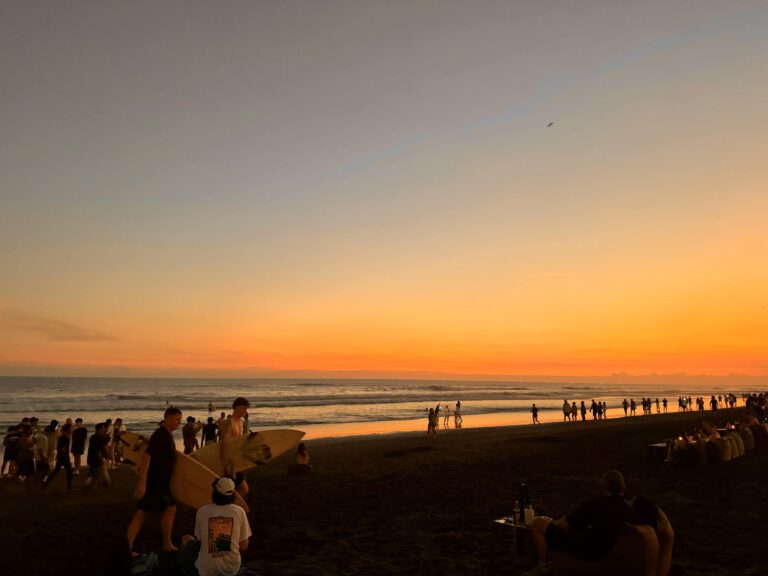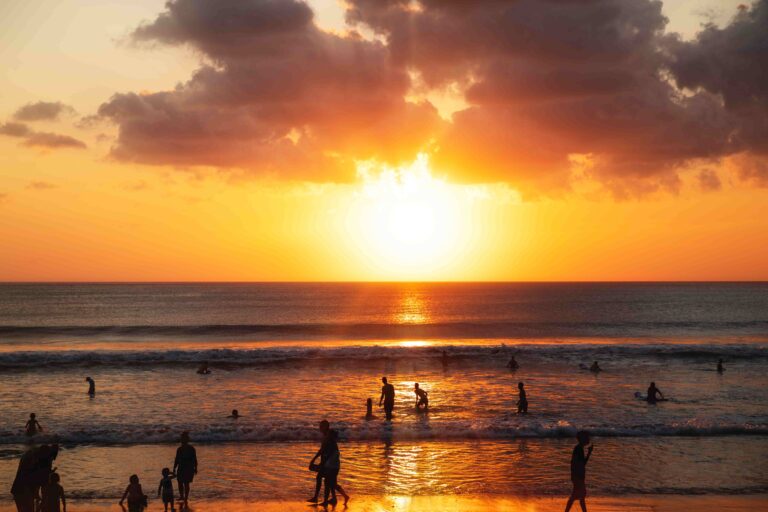If you’re coming to Bali for a short holiday, you don’t need to master the Indonesian language or the native language, Basa Bali, to have a good time.
However, if you can learn a few basic Balinese words then your efforts will be much appreciated and you will find it’s much easier to make friends and get things done.
Here’s everything you need to know about what to speak in Bali.
Getting By In Bali Without The Native Language

The Indonesian archipelago is absolutely huge and there are over 1,000 languages spoken across the nation! However, there are three major languages in Bali.
They are Basa Bali (or Bahasa Bali), Bahasa Indonesia, and English.
Yes, the third language spoken in Bali is English and while not all the Balinese people speak English and not all of those who do in the region speak perfect English, most know enough basic words of English to make your time here perfectly easy, speaking only English.
The Balinese don’t speak many other foreign languages mind you and German, French, Italian, Russian, etc. speakers will need to fall back on English as a lingua franca or learn one of the two languages in Bali if they want an easy time of things here.
That doesn’t mean there are no other languages served in Bali and you can certainly find tour operators here that conduct business in Chinese, Korean, Japanese, Russian and, of course, Dutch.
Don’t be surprised to find that many Balinese folks sound like Australians, as over thirty per cent of all arrivals here are from Australia.
It’s not unknown to be walking down the road in Kuta for a young Balinese salesperson to approach you with a cheery; “Hey mate!
You may also find that there are some fairly creative translations when it comes to using English in print and while most restaurants have an English menu, not all of them make perfect sense.
Bahasa Indonesia & Bahasa Bali – The Most Widely Spoken Languages
The official language of Indonesia is Bahasa Indonesia. The word “bahasa” just means “language”.
It is one of the official languages of Bali but it’s not most people’s native tongue.
Most Balinese speak “Bahasa” of “Bali” which is often written and pronounced as Basa Bali.
If you learn just a few words of either of these languages in Bali, you will find that you get a much better reception from local people, who will feel valued that you’ve tried to learn to communicate with them.

Bahasa Indonesia is a relatively easy language to learn. It is written using our alphabet and pronunciation is purely phonetic (that is you say it as you read it).
It has some of the simplest grammar of any language too. There is also the advantage that if you learn Indonesian, you can use it all over the vast archipelago rather than just in Bali.
You will have no problems communicating with most Indonesians using this language.
Curiously, it’s also very similar to Malay and somewhat similar to the Philippines’ main language, Tagalog. So, if you learn Indonesian, you can quickly learn Malay and get some advantage in learning Tagalog too.
Balinese, on the other hand, is a much harder language to learn and its main use is on this beautiful island. If you go to Jakarta, almost no one will recognize that you speak the language in Bali.
The language in Bali is complicated by the fact that it’s based on the feudal system of Hinduism and while Balinese Hinduism does vary from the Indian version, it still has some trappings of feudalism.
So, most Balinese people are of the “Sudra” caste and they will speak a common version of Balinese.
Then there’s a high (or “Halus”) variant which is actually a version of the Javanese tongue and it’s used for talking to strangers, whose place in the caste system you don’t understand, or your social superiors.
On top of that, there’s also “Kawi” which, a bit like Latin, is used for ancient stories and plays. You will also find Balinese incorporates Sanskrit which is the language for prayer and scripture for Hindus.
Finally, in many situations in 2023, the Balinese use a “modern” form of their language which drops a lot of the complexity of the caste-driven language.
So, we’ve said the two official languages are a bit different from each other but how different are they?
Well, you can see from these simple phrases which we offer in English, the Indonesian, and then in Balinese.
Good morning – Selamat Pagi – Rahajeng Semeng
Good afternoon – Selamat Sore – Rahajeng Semeng
Good night – Selamat Malam – Rahajeng Wengi
Thank you – Terima Kasih – Suksema
You’re welcome – Sama Sama – Suksema Mewali
As you can see they are totally separate languages.
Indonesian is, in fact, a standardized version of the Malaysian language and it’s from the Austronesian language family.
Balinese, on the other hand, comes from the Malayo-Polynesian languages and it’s a subsection of the Bali-Sasak-Sumbawa languages. There are three distinct Balinese linguistic varieties – Highland Balinese, Lowland Balinese and Nusa Penidan Balinese.
How Many People Speak Balinese? How About Indonesian?
While the census undertaken in 2000 showed that about 3 million people speak the local language in Bali, the Bali Cultural Agency found that just a decade later, only 1 million people use the language on a daily basis.
The majority of people here use Indonesian or English more regularly except when talking with older relatives.
This has also led to Balinese becoming a primarily oral language, with the written form becoming increasingly rare.
Many Balinese people who do use Balinese will happily throw in words of Indonesian and/or English while talking too.
Consonants & Vowels In Balinese

There are 6 vowels in Balinese and 18 consonants. These are pronounced with certain tonal intonations.
Balinese is not like Chinese or Vietnamese where a standard pattern of tones is applied with each word, but rather the tones come from the stresses on individual parts of a word.
Most commonly the stress in Balinese is delivered in the last syllable.
Registers In The Balinese Language
A word can have many different forms in Balinese depending on the register it is used in. Basa Ketah, Basa Madia and Basa Singgih.
The use of these registers is denoted by the social standing of the two people talking at the time.
Numbers In Bali
Balinese does use the decimal system.
However, numbers are a bit complicated by the fact that Bali has specific words for some quantities and these are not governed by any particular linguistic rules.
So, for example, there are special words for 45, 175 and 1,600.
Writing Balinese: Aksara Bali Vs The Latin Alphabet
There is a Balinese script and it’s called Aksar Bali or Hanacaraka. This is a pseudo-alphabet in which the consonant-vowel sequences are written as a single character.
It was derived from the Indian Brahmi Script (which originated back in the 3rd century AD) but as far as we can tell, it wasn’t adopted in Bali until around the 9th century AD (which is when the earliest known Balinese inscriptions were written).
It is very rarely used in modern Bali even though the written script is nearly identical to the written Javanese script.
Instead, they teach “Tulisan Bali” which is a slightly modified version of our own Latin script.
How Do You Say “Hello” In Balinese?
“Hello” in Balinese is Om Suawastuastu which technically translates to “Peace and Greetings from God” but it is used exactly as you would use “Hello” in English.
It’s worth noting that “namaste” is not in common use in Bali and usually only turns up at yoga shalas run by foreigners.
How Do You Say “No, Thanks” In Balinese?
“Ten, Matur Suksma” is the Balinese and “Terima Kasih” is the Indonesia. Both are very polite and you should have no fear of delivering these phrases when you don’t want to be hassled or just don’t want what’s on offer.
How Do You Say “Goodbye” in Balinese?
Sampai jumpa, sampi ketemu which means “see you later”.
The second is offered before you leave somewhere and is “selamat jalan”.
What Is “Thank You” In Balinese?
“Matur Suksma” is the Balinese phrase for “thank you”. Please be aware that the use of “please” and “thank you” is not standard practice in Bali, or indeed in most Asian languages.
However, it is very much appreciated when foreigners use these words and it can help people warm to you.
Final Thoughts On The Balinese Language
So, there you have it, a few basic phrases to get you started and a high-level overview of languages in Bali.
However, for a holiday, English will do just fine.










